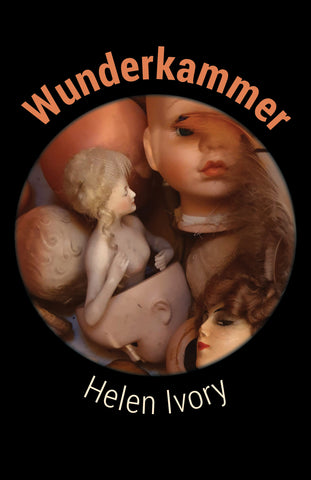Wunderkammer by Helen Ivory
“The moon chomped on by a wolf ‘that chases the sun,’ a mouse wielding an ax, a washing machine set on erasing objects from the world … This is the magical entree to the new and selected poems of Helen Ivory, whose voice reminds me of the unsmiling mask of Buster Keaton—how, with drollness and play, she provides a map of the everyday bizarre and often whimsical possibilities of life lived through a highly playful, rather dark, and deeply imaginative vision. Is there a little Stevie Smith at play here? A little Brothers Grimm? Those and that of a newsreader who has gone off-script and is showing us wherever the expected has yielded to the uncanny and unusual? These poems are a delight for the assurance she provides that everyday wonders, surprises, and quotidian horrors are in our reach and accessible through her word ministry. Brave and imaginative! Read this book.”
—Maxine Chernoff
“Helen Ivory’s poems take place in the world of fables, transformations and portents as delivered in a voice that is characteristic, in fact unique, yet difficult to pin down. It is a world where the moon ‘is pushed down the chimney’s throat’ but where the voice remains orderly, procedural, matter-of-fact, sometimes faintly official like a children’s nurse delivering dangerous news. The news remains dangerous.”
—George Szirtes
“Ivory is an intensely visual poet, and her images could nestle up close to those of artists like Leonora Carrington, say, or Dorothea Tanning: Surrealist painters whose strongest work gives us domestic interiors where the realistic takes the impossible in uncanny matrimony.
“And then … there is Woman, in archetypal form, standing at the center of Ivory’s work. Ivory introduces us to women who disappear in bad marriages; women who are in various ways fed on and consumed; women shut into houses, sometimes for many years; women who parade in new dresses in front of men they should not trust; women silenced in scold’s bridles; needlewomen; cooks; laundresses. But she also brings us into the presence of sorceresses, witches, communers with an ethereal other side—Baba Yagas before whom one trembles.”
—Robert Archambeau, from his Introduction
Paperback: 240 pages
Publisher: Madhat, Inc.
Language: English
ISBN-13: 978-1-952335-57-0






